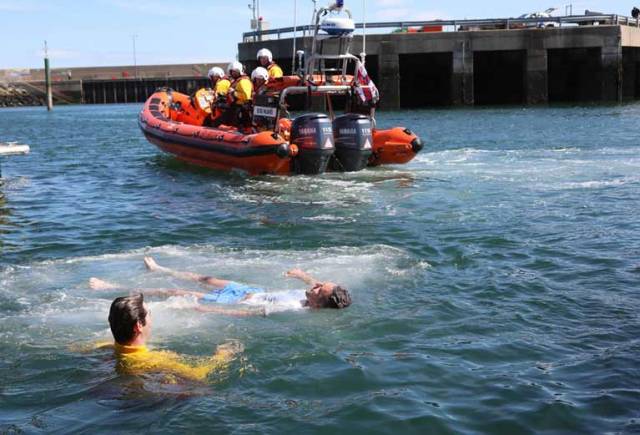The RNLI has today launched its 2018 national drowning prevention campaign, Respect the Water, in Northern Ireland.
The launch at Bangor Lifeboat Station comes as the RNLI said that seven people claimed floating helped save their life in 2017 after the charity advocated this as a key survival skill last summer.
The Respect the Water campaign is now in its fifth year and the charity is urging anyone who finds themselves in trouble in cold water to follow the FLOAT message and stay calm and ‘float’ on your back for a short time to regain control of your breathing.
The RNLI is calling on the public to practice the ‘float’ survival skill – a simple skill that could mean the difference between life and death. This skill was demonstrated at this morning’s launch by Aaron Vance, the close friend of a County Down man who died from drowning while on holiday in Portugal last year.
The family of 29-year-old William Coates from Newtownards who died suddenly in a swimming pool last May, are supporting this year’s Respect the Water campaign. Billy and Brenda Coates hope that by sharing their personal story of losing a loved one to drowning, that people will hear the ‘Float’ message and share the RNLI’s lifesaving knowledge with others.
William’s father Billy said: 'Our son William had just arrived in Portugal on a weekend break with some friends, after a few hours by the poolside, he went for a swim and drowned, this all happened within minutes of going into the water. We were told his death was due to drowning which was brought on by a cold water heart attack as soon as he jumped into the swimming pool.
‘While we don’t know if using the float survival skill would have been an option for William in his situation, as a family, we do know the horrendous impact of losing a son and a brother to drowning. We believe that if one person can remember the float message and if one life can be saved, then the lives of so many others - family and friends - will also be saved from the pain and heartache of losing a loved one.’
The RNLI has created a new video here explaining the five steps to floating, to help give people the confidence to be able to float if they find themselves in trouble in cold water.
Mike Grocott, RNLI Area Lifesaving Manager said: ‘Losing someone to drowning is a shattering experience, so I am very pleased several people said the RNLI’s Respect the Water ‘float’ advice helped them survive in a dangerous situation in the water last year. We are hopeful that our safety campaigning and education work will contribute to a reduction in deaths, but we must all keep sharing lifesaving advice. One drowning is one too many.’
For those planning to go into the water, the best way to enjoy it safely is to choose a lifeguarded beach and swim between the red and yellow flags – the area most closely monitored by the lifeguards. And if you see someone else in danger in the water at the coast, fight your instinct to go in and try to rescue them yourself, instead call 999 or 112 and ask for the Coastguard.’
The Respect the Water campaign will run throughout the summer with advertising across cinema, outdoor posters, radio, online, and catch-up TV channels.































































